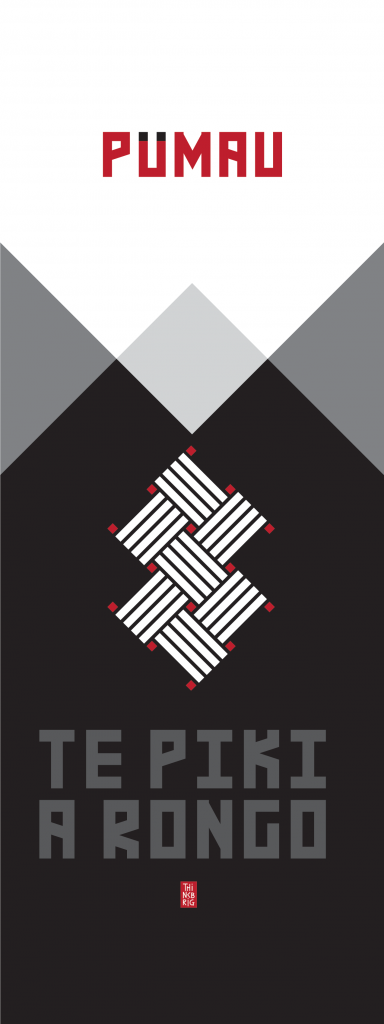Faith – Pūmau: Te Piki ā Rongo

Rongo:
“To hear, feel, smell, taste, perceive – used for all the senses except sight.”[1]
Acrylic on canvas 1600 x 600mm
The word Rongo refers to four of the five senses, touch (feel), hearing, taste and smell. It does not include sight.
Faith, for me has been ever elusive – when I think I am there, I turn and see there is still more to do. I do not think this is necessarily a bad thing. For me, faith is a journey and not a destination. But sometimes it would be good if it were.
Rongo is interesting because it does not include sight and when it comes to faith, our (well mine anyways) default is that seeing is believing. We forgo the other four senses that are confirming to us that it is true but because the one sense, sight is not revealing what the other four are saying, we go with what we see.
It is my nature to see the negative in a magnified state and not trust those messages of faith, of hope and desire (maybe this is why faith, for me is a journey). I want to, but, I cannot see it with my physical eyes. I want to see the end now. I do not want to wait and have my faith tested. I am impatient.
The four white diagonal lines next to each other are the four senses (touch, hear, taste and smell. These are predominant, easily seen in the pattern. The small red square represents sight. Small, not so easy to see, but, still I want that ‘sign,’ that physical proof. I want sight to be the predominant aspect of developing faith and is why it is in red, a chiefly colour.
The grouping of these is a line-upon-line (Isaiah 28:10) and when the pattern repeats it forms a climbing up experience, thus the name of the pattern “Te Piki a Rongo”, the Climb of Rongo. While I need to follow this wisdom of trusting the other four senses, in my case, I have demoted the four senses, stopped trusting them and promoted this one small sense that has stuffed me up so many times.
The background, depicts a state darkness, loss, moving upwards into a state of enlightenment, or whiteness, clarity. The clarity also points downwards and it is not a permanent state. We have to work at it. When we don’t work at it, we automatically move to a darker state of being. We move between these states because it is our nature. We probably frequent the state of grey the most.
[1] https://maoridictionary.co.nz/search?idiom=&phrase=&proverb=&loan=&histLoanWords=&keywords=rongo (11 April 2020)
—
I created these, like tukutuku, as a reminder of what the ideal situation should be like. Our intentions is one of working towards these ideals and it works best when all are onboard trying to reach these. Our individuality remains important in being unified in this. Being an individual and unified is an important paradox. It requires all of the principles to reach it and to have happy and successful marriages and families:
| Pūmau | Faith | Te Piki ā Rongo |
| Inoi | Prayer | E tō Mātou Matua Nui te Rangi |
| Rīpenetātanga | Repentance | Roimata Toroa |
| Muru | Forgiveness | Huka Korio |
| Kauanuanu | Respect | Hohou i te Rongo |
| Aroha | Love | Ngā Hīhī o te Aroha |
| Ngākau Aroha | Compassion | Pūpūharakeke |
| Whakamahi | Work | Whakakotahi |
| Pārekareka | Wholesome recreational activities | Te Whai Wawewawe a Maui |
Te Whare Tukutuku explanations:
